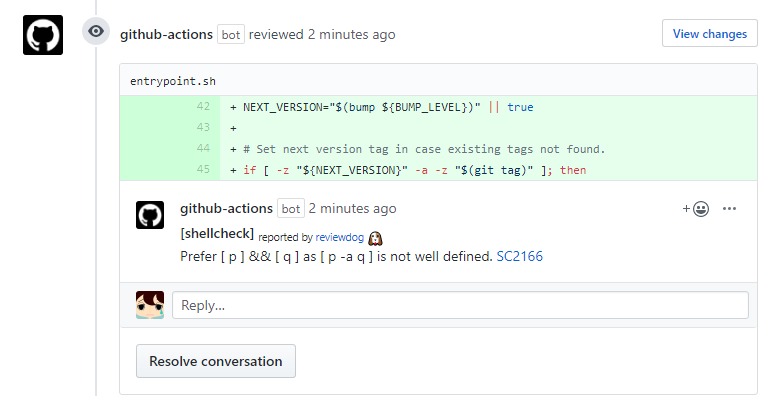This action runs ansible-lint with reviewdog on pull requests to enforce best practices.
By default, with reporter: github-pr-check an annotation is added to
the line:
With reporter: github-pr-review a comment is added to
the Pull Request Conversation:
Required. Must be in form of github_token: ${{ secrets.GITHUB_TOKEN }}.
Optional. Report level for reviewdog [info,warning,error].
It's same as -level flag of reviewdog.
The default is error.
Optional. Reporter of reviewdog command [github-pr-check,github-pr-review].
The default is github-pr-check.
Optional. Filtering for the reviewdog command [added,diff_context,file,nofilter].
The default is added.
See reviewdog documentation for filter mode for details.
Optional. Exit code for reviewdog when errors are found [true,false].
The default is false.
See reviewdog documentation for exit codes for details.
Required. Paths to ansible files (i.e., playbooks, tasks, handlers etc..) or valid Ansible directories according to the Ansible role directory structure.
Optional. Arguments to be passed to the ansible-lint (verbosity & parsable options not supported here)
Options:
-r RULESDIR specify one or more rules directories using one or
more -r arguments. Any -r flags override the default
rules in ansiblelint/rules, unless -R is also used.
-R Use default rules in ansiblelint/rules in addition to
any extra
rules directories specified with -r. There is no need
to specify this if no -r flags are used
-t TAGS only check rules whose id/tags match these values
-x SKIP_LIST only check rules whose id/tags do not match these
values
--exclude=EXCLUDE_PATHS
path to directories or files to skip. This option is
repeatable.
-c C Specify configuration file to use. Defaults to ".ansible-lint"Optional. Allows pinning pip packages and there versions. This allows to pin to a target package version in order to maintain consistency with local development.
The ansible-lint command return code.
The reviewdog command return code.
name: reviewdog
on: [pull_request]
jobs:
ansible-lint:
name: runner / ansible-lint
runs-on: ubuntu-latest
steps:
- name: Clone repo
uses: actions/checkout@v2
# Minimal example
- name: ansible-lint
uses: barolab/action-ansible-lint@master
with:
github_token: ${{ secrets.github_token }}
targets: ./**/*.yml
# More complex example
- name: ansible-lint
uses: barolab/action-ansible-lint@master
with:
github_token: ${{ secrets.github_token }}
reporter: github-pr-review # Optional. Change reporter
fail_on_error: "true" # Optional. Fail action if errors are found
filter_mode: "nofilter" # Optional. Check all files, not just the diff
targets: | # Required. The files to lint
./testdata/**/*.yml
./testdata/**/*.yaml
args: "-x 301" # Optional. Add custom ansible-lint arguments
override-deps: | # Optional. Pin pip packages versions
ansible~=2.9
ansible-lint~=4.1You can bump version on merging Pull Requests with specific labels (bump:major,bump:minor,bump:patch). Pushing tag manually by yourself also work.
This action updates major/minor release tags on a tag push. e.g. Update v1 and v1.2 tag when released v1.2.3. ref: https://help.github.com/en/articles/about-actions#versioning-your-action
This reviewdog action template itself is integrated with reviewdog to run lints which is useful for Docker container based actions.
Supported linters:
This repository uses haya14busa/action-depup to update reviewdog version.





